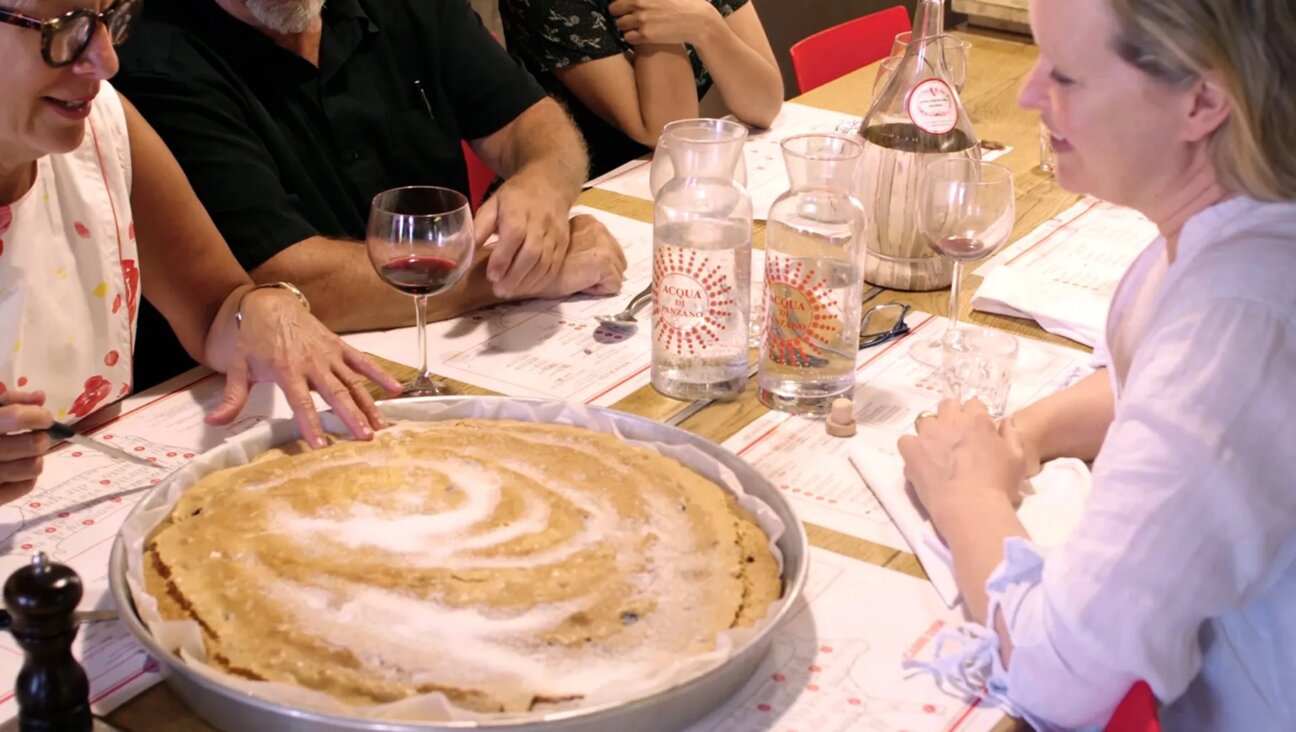Taste Test: ‘Artisan Jewish Deli’s’ Stuffed Cabbage

Image by caren alpert
Along with making my own pastrami, I was excited to test Cabbage Rolls in Tomato Sauce (though I know them as stuffed cabbage) from Nick Zukin and Michael C. Zusman’s “The Artisan Jewish Deli at Home”.
This is a dish I grew up on; my Russian-born grandma made it all the time. And when I thought about it, given that she died in 2002, and stopped cooking much before that, and my mom never made it, I realized I probably hadn’t eaten it in over 20 years.
Ground beef is mixed with onion, barely-cooked white rice, garlic, parsley, raisins and eggs, and rolled into blanched cabbage leaves, and then baked in a tomato sauce.
The amount of brown sugar in the tomato sauce had me guessing that I would find the dish too sweet, and I did. However, biting into it provided such a sense of nostalgia for my Babushka’s cooking that I could overlook it, especially since this is how the dish is traditionally made.
“I can see why my ancestors would have made this,” said Sam, one of our friends who tasted the dish at a Shabbat dinner at our house. Unlike the Reubens, she felt this was much healthier and more balanced. She felt it was solid, get-you-through-the-winter kind of food.
Our other guest Adam appreciated that for Jewish food, it was low on carbohydrates, and didn’t have to be smashed between two pieces of bread. Additionally, he happens to love cabbage. “I think cabbage gets a bad rap,” he said.
He too thought the sauce was too sweet, and would have preferred taking it into a more savory direction, perhaps with some Worcestershire sauce.
Sweet sauce aside, when we returned home to stuffed cabbage leftovers a few days later, having this nourishing food awaiting me was a mechaya (joy). As someone who hasn’t tasted her mother or grandmother’s cooking in so long, I truly felt I was eating a dish made by my grandma, and for that alone, it was worth it.
Would You Make This? All of us: yes, with a less sweet sauce.
Cabbage Rolls in Tomato Sauce
Serves 6
Cabbage rolls, also known as stuffed cabbage or in Yiddish as prakes, are an old-time Jewish deli favorite that, sadly, are seldom seen except on the most traditionalist menus. Variations of moist-heat-softened cabbage leaves rolled around meat and grain have roots going back millennia. The dish lends itself superbly to home cooking; day-old leftovers taste even better than the freshly made rolls. As with so many traditional dishes enjoyed by the Ashkenazis and other impecunious populations, this one begins with cheap and abundant cabbage and makes a little ground beef go a long way with the addition of rice, onion, eggs, and raisins. The paprika adds a piquant Hungarian accent to the ensemble.
Cabbage rolls Kosher salt
1 extra-large head savoy cabbage (about 3 pounds)
½ cup long-grain white rice
1¼ pounds ground beef
1 medium yellow onion, grated on the coarse side of a box grater
½ cup raisins
2 large eggs, beaten
¼ cup chopped fresh flat-leaf parsley
1 clove garlic, minced
½ teaspoon freshly ground black pepper
Tomato sauce 2 tablespoons extra-virgin olive oil
1 large yellow onion, thinly sliced
¼ cup firmly packed light brown sugar
½ cup dry red wine
1 (28-ounce) can crushed tomatoes, including the liquid
1½ teaspoons kosher salt
1 teaspoon Hungarian sweet paprika
Juice of ½ lemon
To make the cabbage rolls, preheat the oven to 325°F. Fill a large pot two-thirds full of water, season it generously with salt, and bring it to a boil over high heat. Line a rimmed baking sheet with a clean kitchen towel.
Core the cabbage and carefully lower it into the boiling water. Boil the cabbage, covered, until the outer leaves are tender, about 5 minutes. Using tongs, begin peeling away the outermost leaves from the cabbage as they are cooked, and transfer them to the baking sheet. Continue cooking the cabbage until all of the leaves that are large enough to fill have been removed. You should have about 12 leaves. Remove the center of the cabbage from the water and thinly slice it, discarding any remnants of the core. Scatter the sliced cabbage in the bottom of a large, shallow baking dish (a 10 by 15-inch glass dish is ideal). Remove the large, white center ribs from the whole cabbage leaves. Set the cabbage aside to cool while you prepare the filling.
Cook the rice in a small pan of salted boiling water for 3 minutes; drain well. In a large bowl, mix together the beef, onion, raisins, eggs, parsley, garlic, pepper, and 1 tablespoon plus 1 teaspoon of salt. Stir in the rice.
Working with one cabbage leaf at a time, fill each leaf with about ⅓ cup (¼ cup for smaller leaves) of the meat mixture. Place the meat toward the tip of the leaf, opposite the core end. Fold the sides over the filling and roll it up to completely encase the filling. Arrange the cabbage rolls in the baking dish, seam side down.
To make the sauce, heat the oil in a large saucepan over medium-high heat. Add the onion and cook, stirring occasionally, until golden brown, 8 to 10 minutes. Stir in the brown sugar until it is dissolved. Pour in the wine and cook, stirring occasionally, until it is almost completely evaporated, 3 to 5 minutes. Add the tomatoes, salt, paprika, and lemon juice and bring the mixture to a boil. Lower the heat to medium, and simmer for 5 minutes.
Pour the sauce over the cabbage rolls. Cover the baking dish tightly with aluminum foil (or a lid if it has one), and bake the cabbage rolls for 1 hour. Portion the cabbage rolls onto warmed plates and top with the sauce. Serve immediately.
From “The Artisan Jewish Deli at Home” by Nick Zukin and Michael Zusman/Andrews McMeel Publishing, LLC
The Forward is free to read, but it isn’t free to produce

I hope you appreciated this article. Before you go, I’d like to ask you to please support the Forward.
Now more than ever, American Jews need independent news they can trust, with reporting driven by truth, not ideology. We serve you, not any ideological agenda.
At a time when other newsrooms are closing or cutting back, the Forward has removed its paywall and invested additional resources to report on the ground from Israel and around the U.S. on the impact of the war, rising antisemitism and polarized discourse.
This is a great time to support independent Jewish journalism you rely on. Make a gift today!
— Rachel Fishman Feddersen, Publisher and CEO
Support our mission to tell the Jewish story fully and fairly.
Most Popular
- 1

Fast Forward Ye debuts ‘Heil Hitler’ music video that includes a sample of a Hitler speech
- 2

Opinion It looks like Israel totally underestimated Trump
- 3

Culture Cardinals are Catholic, not Jewish — so why do they all wear yarmulkes?
- 4

Fast Forward Student suspended for ‘F— the Jews’ video defends himself on antisemitic podcast
In Case You Missed It
-

Culture How one Jewish woman fought the Nazis — and helped found a new Italian republic
-

Opinion It looks like Israel totally underestimated Trump
-

Fast Forward Betar ‘almost exclusively triggered’ former student’s detention, judge says
-

Fast Forward ‘Honey, he’s had enough of you’: Trump’s Middle East moves increasingly appear to sideline Israel
-
Shop the Forward Store
100% of profits support our journalism
Republish This Story
Please read before republishing
We’re happy to make this story available to republish for free, unless it originated with JTA, Haaretz or another publication (as indicated on the article) and as long as you follow our guidelines.
You must comply with the following:
- Credit the Forward
- Retain our pixel
- Preserve our canonical link in Google search
- Add a noindex tag in Google search
See our full guidelines for more information, and this guide for detail about canonical URLs.
To republish, copy the HTML by clicking on the yellow button to the right; it includes our tracking pixel, all paragraph styles and hyperlinks, the author byline and credit to the Forward. It does not include images; to avoid copyright violations, you must add them manually, following our guidelines. Please email us at [email protected], subject line “republish,” with any questions or to let us know what stories you’re picking up.
















